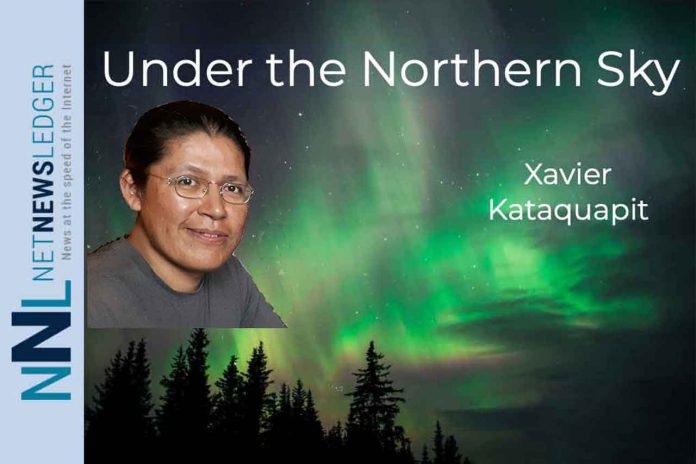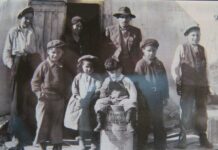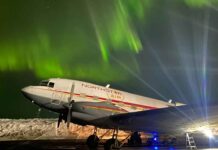by Xavier Kataquapit
I’ve been trying to catch a glimpse of the Wawatay lately. Wawatay is the Cree word that describes the northern lights or Aurora Borealis. I use an app on my phone called My Aurora Forecast these days to keep track of the lights but I never seem to have much luck.
When the Wawatay are out, there are clouds blocking my view or I am in the wrong place at the wrong time. Most times, the Wawatay are overhead but they are just too faint to be seen because of the all the light pollution surrounding me. To see them it takes time and it is something that requires patience and persistence. When I get my alerts, I find that I have to spend hours in the dark, late into the night and into the early morning in order to catch a glimpse of these amazing lights.
In my home community of Attawapiskat on the James Bay coast, the northern lights were a normal part of our lives. Wawatay to everyone up north were just as normal as the stars and moon. We lived with them. We honoured them.
There were no street lights in the community in the 1980s. Whenever we stepped outside at night time it felt like we were in the wilderness surrounded by an endless deep dark star filled sky.
My parents, who were born on the land on the James Bay coast, always had a great respect for these mysterious lights. They and many other Elders in the community warned us to be careful. We were taught as children that the Wawatay was a messenger or spirits watching over us and keeping us safe. However that closeness had to be balanced with care and respect. If the lights were small, distant and faded, we were taught that we could call them by whistling into the night sky. If we whistled long and loud enough, eventually they would hear us and drift closer and become brighter. I can remember my dad Marius telling us to stop whistling when the lights shone close overhead. He explained that if we whistled too much, the lights could drift down and bring these spirits too close to us which might not be a good thing. When they get very close you can even hear them.
I can remember northern lights dancing in thin wisps and glimpses of lights and also as glowing clouds of green and purple light. On a few occasions, we saw some events where the entire sky seemed to be filled with nothing but northern lights and everything was painted with the glow from cathedral like towers of many colours of light. On some of the coldest nights of the year, the northern lights would blend in with an ice fog that would create a light show of green hues high in the air and red tinged pillars of light below surrounded by a veil of white fog. All of this bounced off the snow covered land and the entire world was magical.
The modern scientific name for these lights Aurora Borealis was a term first used by the famous astronomer Galileo Galilei in the 1600s. The first part of the name was for Aurora, the Roman goddess of the dawn and the second part for Boreas, the Greek god of the north wind. It is very poetic name as these lights often appear as spectacular celestial shows in the early morning hours and seem to blow and move about with the northern winds. I think it is a perfect description.
In the 1970s when our communities were just starting to organize themselves into political representation, many advocates decided it was important to develop a Native run media outlet to represent our communities. They chose the name Wawatay for the newly formed communications organization that went on to create the newspaper Wawatay News and the radio broadcaster Wawatay Radio. I remember representatives and Elders at the time explaining that the name Wawatay was chosen because the news they would create and share in print on newspaper and over the airwaves as radio broadcasts was like the spirits of Wawatay traveling to all the communities in the north. Wawatay has faithfully provided my people with news and connections for decades when it was difficult for our voices to be heard on mainstream media.
These days as we live busy lives involved with so much technology, frightened by the terrible wars in the Middle East and Ukraine and worried about the devastation of climate change it is good to be able to simply venture out to a dark area to catch a glimpse of the Wawatay and marvel in their beauty and the wonder. They fill us with awe and light up the darkness with hope.







